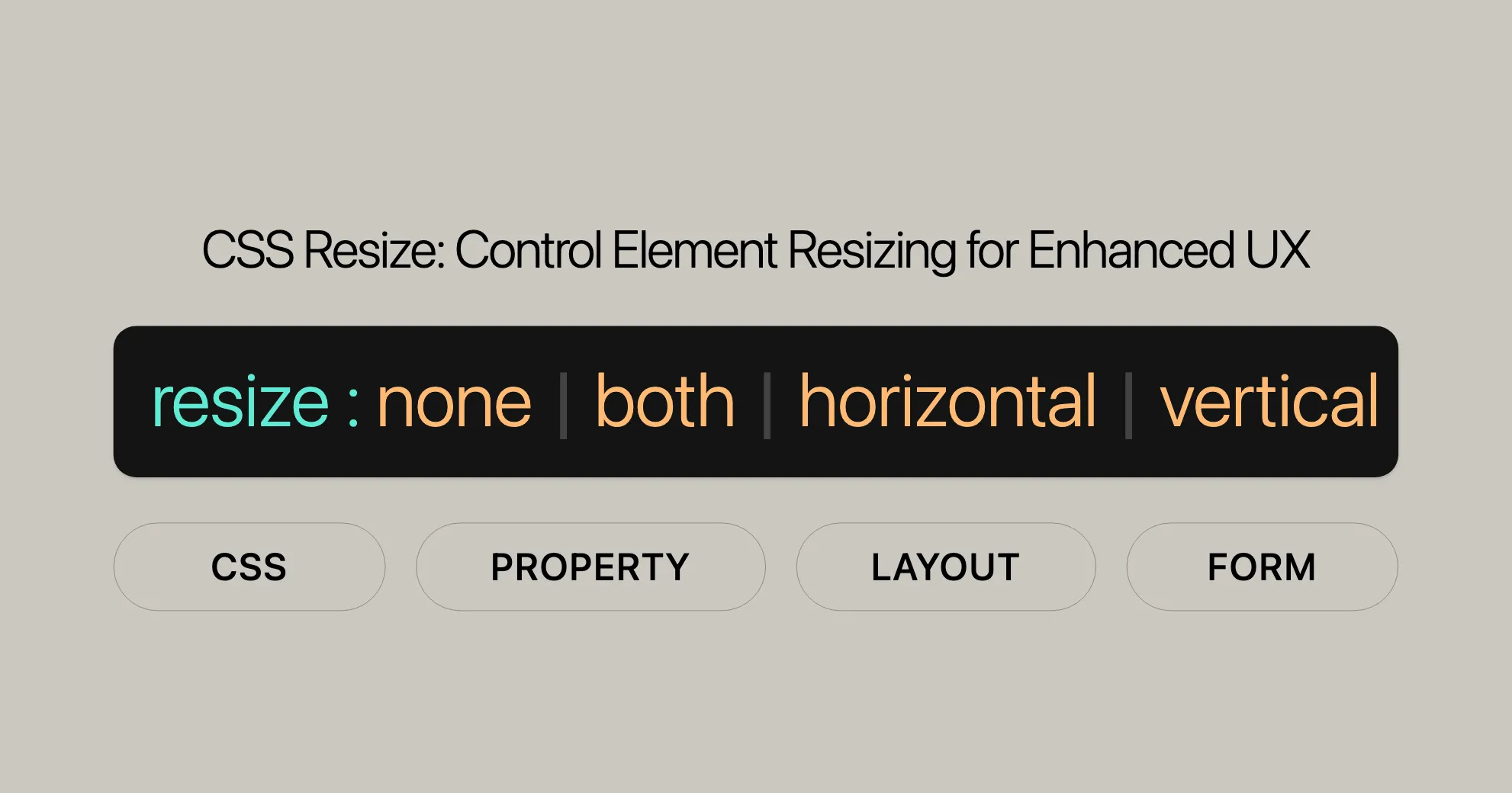- Services
- Case Studies
- Technologies
- NextJs development
- Flutter development
- NodeJs development
- ReactJs development
- About
- Contact
- Tools
- Blogs
- FAQ
CSS Resize Control Element Resizing for Enhanced UX
Options include resizing horizontally, vertically, both, or none.

Disabling Resizability of Textareas
In many browsers, <textarea> elements are resizable by default. However, you might want to prevent users from resizing them to maintain a consistent layout. You can do this by setting the resize property to none.
HTML
<textarea>Type some text here.</textarea>CSS
textarea { resize: none; /* Disables resizability */}Example
Here’s a complete example showing how to disable the resizability of a <textarea> element:
<!DOCTYPE html><html><head> <title>Disable Textarea Resizing</title> <style> textarea { resize: none; /* Disables resizability */ border: 2px solid green; padding: 10px; width: 300px; height: 150px; } </style></head><body> <center> <h1>Disable Textarea Resizing</h1> <textarea>Type some text here.</textarea> </center></body></html>When to Use
Disabling the resizability of textareas can be beneficial in various scenarios:
- Consistent Layout: Maintain a consistent look and feel across your website.
- Form Design: Ensure that forms look uniform and are easy to navigate.
- User Experience: Prevent users from accidentally resizing elements, which could disrupt the layout.
Using Resize with Arbitrary Elements
You can use the resize property on any element, not just textareas. This makes elements like divs and paragraphs resizable.
HTML
<div class="resizable"> <p class="resizable"> This paragraph is resizable in all directions, because the CSS `resize` property is set to `both` on this element. </p></div>CSS
.resizable { resize: both; overflow: scroll; border: 1px solid black; height: 300px; width: 300px;}
.resizable p { height: 200px; width: 200px;}Example
Here’s how to make a <div> element resizable:
<!DOCTYPE html><html><head> <title>Resizable Div</title> <style> .resizable { resize: both; overflow: scroll; border: 1px solid black; height: 300px; width: 300px; }
.resizable p { height: 200px; width: 200px; } </style></head><body> <center> <h1>Resizable Div</h1> <div class="resizable"> <p class="resizable"> This paragraph is resizable in all directions, because the CSS `resize` property is set to `both` on this element. </p> </div> </center></body></html>When to Use
Using resize with arbitrary elements is useful for:
- Interactive Layouts: Enhances interactivity and makes the webpage engaging.
- Customizable Interfaces: Provides flexibility for users to adjust the view.
- Dynamic Content: Helps users adjust the size to better view the content.
Additional Examples
Resizing Only Horizontally
Set the resize property to horizontal for horizontal resizing only.
HTML
<div class="horizontal-resize"> <p>This paragraph is resizable only horizontally.</p></div>CSS
.horizontal-resize { resize: horizontal; overflow: auto; border: 1px solid black; width: 300px; height: 200px;}Resizing Only Vertically
Set the resize property to vertical for vertical resizing only.
HTML
<div class="vertical-resize"> <p>This paragraph is resizable only vertically.</p></div>CSS
.vertical-resize { resize: vertical; overflow: auto; border: 1px solid black; width: 300px; height: 200px;}Specifications
The resize property is defined in the CSS Basic User Interface Module Level 4.
- Specification: CSS Basic User Interface Module Level 4
Key Points from the Specification
- Property Name:
resize - Description: Controls if an element is resizable and in which directions.
- Values:
none: No resizing.both: Resizable horizontally and vertically.horizontal: Resizable only horizontally.vertical: Resizable only vertically.block: Resizable in the block direction.inline: Resizable in the inline direction.
- Global Values:
inherit: Inherits the value from the parent.initial: Sets to the initial value (none).revert: Reverts to the default value.revert-layer: Reverts to the default value for the cascade layer.unset: Uses the inherited value or initial value.
Importance of Specifications
Understanding specifications ensures correct and effective use of the resize property across different browsers.
Browser Compatibility
The resize property in CSS is widely supported across various browsers, both on desktop and mobile platforms.
Desktop Browsers
- Google Chrome: Supports the
resizeproperty. - Microsoft Edge: Supports the
resizeproperty. - Firefox: Supports the
resizeproperty. - Safari: Supports the
resizeproperty. - Opera: Supports the
resizeproperty.
Mobile Browsers
- Chrome for Android: Supports the
resizeproperty. - Firefox for Android: Supports the
resizeproperty. - Safari on iOS: Supports the
resizeproperty. - Samsung Internet: Supports the
resizeproperty. - Opera Mobile: Supports the
resizeproperty.
Key Points
- Widespread Support: The
resizeproperty is generally well-supported across major desktop and mobile browsers. - Consistency: While the
resizeproperty is supported in most browsers, there may be slight differences in how it is implemented and rendered. - Testing: It is always a good practice to test your web application across different browsers to ensure consistent behavior and user experience.
Resources for Browser Compatibility
For the most up-to-date and detailed information on browser compatibility, you can refer to resources such as:
- Can I Use: A comprehensive website that provides information on browser support for various web technologies.
- MDN Web Docs: Mozilla’s developer network offers detailed documentation and browser compatibility information.
See Also
For further exploration, check out these resources:
Related CSS Properties
- [
<textarea>]WebsiteUrl: Learn more about the<textarea>element. - [
overflow]WebsiteUrl: Understand theoverflowproperty. - [
box-sizing]WebsiteUrl: Explore thebox-sizingproperty. - [
flexbox]WebsiteUrl: Learn about the Flexible Box Layout module. - [
grid]WebsiteUrl: Discover the CSS Grid Layout module.
Documentation and Guides
- MDN Web Docs: Comprehensive CSS documentation.
- CSS-Tricks: Articles and tutorials on CSS.
- W3Schools: Tutorials and references on web technologies.
Conclusion
Understanding the browser compatibility of the resize property is crucial for web developers. By being aware of the support levels across different browsers, you can make informed decisions about when and how to use the resize property in your projects. Testing your web application across multiple browsers will help ensure a consistent and optimal user experience.
 สร้างเว็บไซต์ 1 เว็บ ต้องใช้งบเท่าไหร่? เจาะลึกทุกองค์ประกอบ website development cost อยากสร้างเว็บไซต์แต่ไม่มั่นใจในเรื่องของงบประมาณ อ่านสรุปเจาะลึกตั้งแต่ดีไซน์, ฟังก์ชัน และการดูแล พร้อมตัวอย่างงบจริงจาก Till it’s done ที่แผนชัด งบไม่บานปลายแน่นอน
สร้างเว็บไซต์ 1 เว็บ ต้องใช้งบเท่าไหร่? เจาะลึกทุกองค์ประกอบ website development cost อยากสร้างเว็บไซต์แต่ไม่มั่นใจในเรื่องของงบประมาณ อ่านสรุปเจาะลึกตั้งแต่ดีไซน์, ฟังก์ชัน และการดูแล พร้อมตัวอย่างงบจริงจาก Till it’s done ที่แผนชัด งบไม่บานปลายแน่นอน  Next.js สอน 14 ขั้นตอนเบื้องต้น: สร้างโปรเจกต์แรกใน 30 นาที เริ่มต้นกับ Next.js ใน 14 ขั้นตอนเพียงแค่ 30 นาที พร้อม SSR/SSG และ API Routes ด้วยตัวอย่างโค้ดง่าย ๆ อ่านต่อเพื่อสร้างโปรเจ็กต์แรกได้ทันทีที่นี่
Next.js สอน 14 ขั้นตอนเบื้องต้น: สร้างโปรเจกต์แรกใน 30 นาที เริ่มต้นกับ Next.js ใน 14 ขั้นตอนเพียงแค่ 30 นาที พร้อม SSR/SSG และ API Routes ด้วยตัวอย่างโค้ดง่าย ๆ อ่านต่อเพื่อสร้างโปรเจ็กต์แรกได้ทันทีที่นี่  วิธีสมัคร Apple Developer Account เพื่อนำแอปขึ้น App Store ทีละขั้นตอน อยากปล่อยแอปบน App Store ระดับโลก มาอ่านคู่มือสมัคร Apple Developer Account พร้อมเคล็ดลับ TestFlight และวิธีอัปโหลดที่ง่ายในบทความเดียวนี้ได้เลย
วิธีสมัคร Apple Developer Account เพื่อนำแอปขึ้น App Store ทีละขั้นตอน อยากปล่อยแอปบน App Store ระดับโลก มาอ่านคู่มือสมัคร Apple Developer Account พร้อมเคล็ดลับ TestFlight และวิธีอัปโหลดที่ง่ายในบทความเดียวนี้ได้เลย  TypeScript Interface คืออะไร? อธิบายพร้อมวิธีใช้และข้อแตกต่างจาก Type เรียนรู้วิธีใช้ TypeScript Interface เพื่อสร้างโครงสร้างข้อมูลที่ปลอดภัยและเข้าใจง่าย พร้อมเปรียบเทียบข้อดีข้อแตกต่างกับ Type ที่คุณต้องรู้ ถูกรวมเอาไว้ในบทความนี้แล้ว
TypeScript Interface คืออะไร? อธิบายพร้อมวิธีใช้และข้อแตกต่างจาก Type เรียนรู้วิธีใช้ TypeScript Interface เพื่อสร้างโครงสร้างข้อมูลที่ปลอดภัยและเข้าใจง่าย พร้อมเปรียบเทียบข้อดีข้อแตกต่างกับ Type ที่คุณต้องรู้ ถูกรวมเอาไว้ในบทความนี้แล้ว  Material-UI (MUI) คืออะไร อยากสร้าง UI สวยงามและเป็นมืออาชีพในเวลาอันรวดเร็วใช่ไหม มาทำความรู้จักกับ Material-UI (MUI) ที่ช่วยให้คุณพัฒนาแอปพลิเคชันบน React ได้ง่ายและดูดีในทุกอุปกรณ์
Material-UI (MUI) คืออะไร อยากสร้าง UI สวยงามและเป็นมืออาชีพในเวลาอันรวดเร็วใช่ไหม มาทำความรู้จักกับ Material-UI (MUI) ที่ช่วยให้คุณพัฒนาแอปพลิเคชันบน React ได้ง่ายและดูดีในทุกอุปกรณ์  เปรียบเทียบ 3 วิธีติดตั้ง install node js บน Ubuntu: NVM vs NodeSource vs Official Repo แบบไหนดีที่สุด? เรียนรู้วิธีติดตั้ง Node.js บน Ubuntu ด้วย NVM, NodeSource หรือ Official Repo เลือกวิธีที่เหมาะกับความต้องการของคุณ พร้อมเปรียบเทียบ เพื่อการพัฒนาที่มีประสิทธิภาพ!
เปรียบเทียบ 3 วิธีติดตั้ง install node js บน Ubuntu: NVM vs NodeSource vs Official Repo แบบไหนดีที่สุด? เรียนรู้วิธีติดตั้ง Node.js บน Ubuntu ด้วย NVM, NodeSource หรือ Official Repo เลือกวิธีที่เหมาะกับความต้องการของคุณ พร้อมเปรียบเทียบ เพื่อการพัฒนาที่มีประสิทธิภาพ! Talk with CEO
We'll be right here with you every step of the way.
We'll be here, prepared to commence this promising collaboration.
Whether you're curious about features, warranties, or shopping policies, we provide comprehensive answers to assist you.


